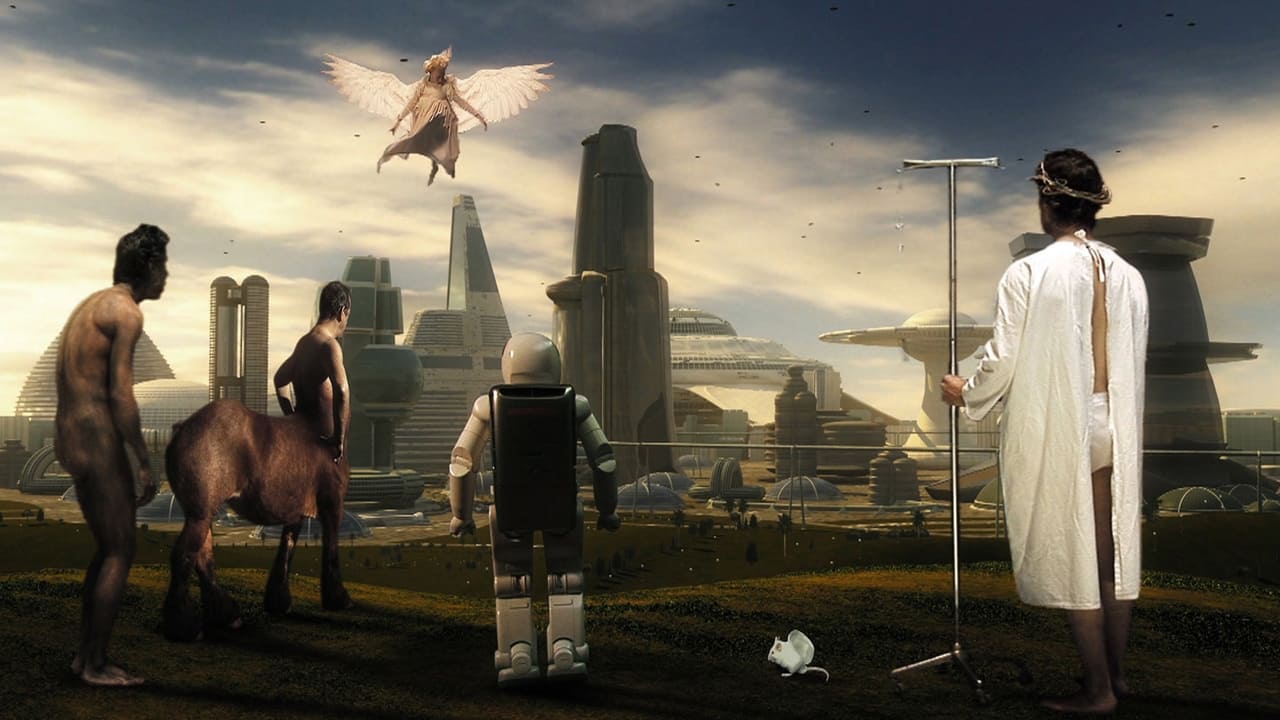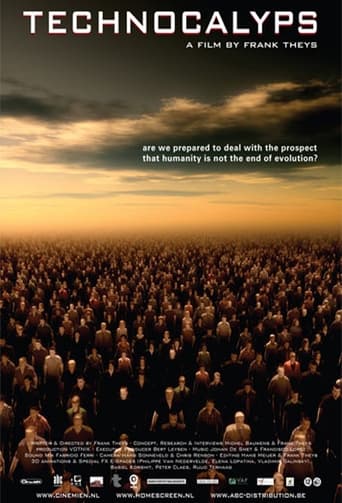Linbeymusol
Wonderful character development!
PlatinumRead
Just so...so bad
Lucybespro
It is a performances centric movie
Aneesa Wardle
The story, direction, characters, and writing/dialogue is akin to taking a tranquilizer shot to the neck, but everything else was so well done.
Madame Superspeedway
The film focuses on the various emerging technologies that Transhumanism has coalesced around and feature illuminating (or potentially terrifying) interviews with scientists working in these fields. It is a really smart look at humanity's quest for immortality through science. It gets into how this quest effects art and culture and how the whole mess intersects to form the very fabric of who we are.
adriatura
The cinematographic execution of the film was in itself downright disappointing. The content on the other hand was mindblowing. I feel as scizophrenic about this film as Hugo de Garis said he feels about the artilect. The ideas presented here, the people being interviewed, the science being presented are awesome to say the least. If you are a self-respecting life form, you should get acquainted with the developments within science & technology and consider the possibility that your current biological form might soon become obsolete. "Technopolyps" is probably not the best place to start, though. The film is all over the place although Frank Theys is trying his best to keep a straight line. You'd be much better off reading the Wikipedia articles on transhumanism, Singularity, Kurzweil etc. However, the film could serve as a useful overview of the main actors & thinkers within the field of transhumanism.Considering that the III films are from 2006, many of the interviews seem outdated, as if they were not recorded recently nor specifically for this film. Especially part I uses old film footage as if it was scientific evidence.The film (narration) often becomes decidedly subjective, which undermines the credibility of the material. This is really lamentable considering that the theme is extremely exciting, interesting and worth being taken seriously. Conclusion: watch it anyway but try to be indulgent with the glitches and awkward moments and be prepared to cherry-pick inbetwixt the information.
keef-mac
If you step back and widen your lens as far as your imagination can stretch, you can find reason in the arguments that Theys is providing. Human interconnectedness via social networks, human bodies being augmented via surgery for the greater good, the XY generation of sex selection in certain countries such as India and China... you could go on and on, and Theys does just that and builds up a fine argument. I could see how some could see this as a skewed perspective. The rhetoric is strongly against technology as a controlling force and soon to be the dominating force. Didn't Wall-E already cover this ground in a nicer version and nobody seemed to complain. Adam Curtis added more rational to the debate in his series Machines of Loving Grace. Society is interconnected into the technologyworld to such a degree that we cant perceive life without it and continue to acknowledge it makes life better for us. So why stop, why not let technology continue to make that life better. You can debate and say that the facts are wrong and that the views are biased but i have a feeling that those who watched this and saw some resonance in it will think in 20-30 years time (after getting a new fake heart and hip), that movie did warn us... its a kinda "Told you so" moment!!!. this is all contained in the first two sections... the third one goes a bit off the wall...There are enough people who are progressive scientists who wish not to look back and only to the future in the hope that reason and rational will eventually bring that answer that faiths and religions. Theys tries to bring this perspective that we will find our own answers in the final part of the section but does so in a weak vague way. Any proper theologists would refute his position as being as narrow as any atheistic view out there. there was no debate or perspective from those from faith formations to see how they view this aspect.All in all, the arguments are thrown out there for you to consider. What Theys intended with this piece is to make people talk. Its not a vision of the future, its just a debate on how it may go unless we question some of these fundamental issues that surround our life. How can we question a mechanism and system that moves so fast, faster than our answers of human reason to find a place in the public, well thats another question....
Nienar
This is supposed to be a documentary about some very hot issues: The relationship between human body and machine, biotechnology and the engineering of our bodies, the ideology of Transhumanism and the Technological Singularity: the imagined point in time when the products of our technology will become autonomous and smart enough to design their successors themselves. These are some very important and exciting issues, closely related to current arising technologies. There are many critics and many proponents of such technologies, all with respectable and informed opinions. None of them appear here.Instead, the whole thing degrades from the first couple of minutes into a conflict between two imaginary sides, the "Scientists" and the "Critics": The former consists of a small number of people chosen for their extremist positions and (often unfounded) expectations of the future, such as the highly controversial entrepreneur Ray Kurzweil and the artist Natasha Vita-More. Their opinions are made to sound as if representing the research community; in truth, they represent a loud but small minority whose (often uninformed) wild expectations about technology are accompanied with militant positions about the inferiority of the human body and nature in general. A small number of renowned thinkers are then added in this group, including Marvin Minsky and Bruce Sterling. Since these are informed people of moderate positions, their interviews are cut to generic one-liners about technological change, and are finally made to appear endorsing the "Mad Pro-Technology Scientists" side. Having scared the viewer to hell with the idea that mad scientists are planning to replace him with a robot in the next 5-10 years, the "documentary" then presents the other side: The Critics. This is an even more caricatured group, led by Kirkpatrick Sale, the man who has described personal computers as "The devil's work". They soon proceed to describe the Unabomber's approach as a very reasonable attitude against the impending technological disaster. 'Nuff said.As if reducing the debate into a cartoon fight between Frankenstein wannabees and machine-bashing hermits was not enough, the movie takes sides: In a display of the most tasteless propagandist tricks, "Scientists" always appear in poorly illuminated labs or have their voice played over images of deformed embryos floating over pitch-black backgrounds. In contrast, the "Critics" rant about smashing civilization from brightly lit natural environments, amidst the chirping of birds and whisper of trees. The result is so raw it's not even funny.Technically, the movie is a bit below mediocre. Simplistic effects, dull editing and pretty much nothing more, all in the service of creating a sense of Nasty Things About To Happen.The most amazing aspect of the documentary is probably the amount of misinformation. Anything said about any subject from Evolutionary Computation to the Luddites is either plain wrong or so misinterpreted it's worse than wrong. In all 2:30 hours of pompous fear-mongering and mad ravings I was hard-pressed to find a handful of actual correct statements. My field being A.I., however, I can only imagine that the degree of misinformation on biotechnology will be more or less the same.All in all, this is a bad, bad film. Do not watch it, or, if you chose to do so, do not believe anything mentioned in it. A pity.

